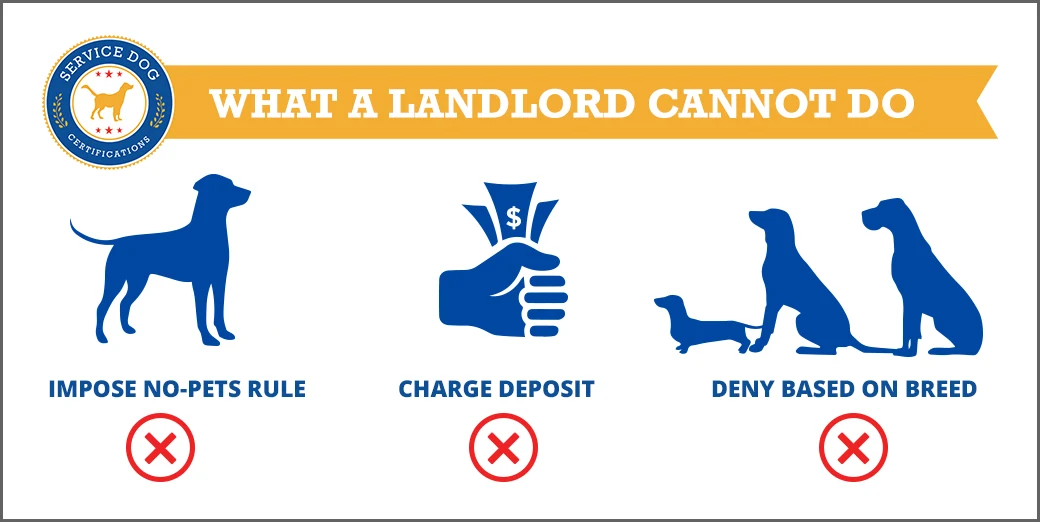Home Page › Blog › Can Landlords Deny a Service Dog?
Can Landlords Deny a Service Dog?

Under the Fair Housing Act, housing providers such as landlords, HOAs, co-ops, and condos must reasonably accommodate service dogs. Housing providers can only deny a tenant’s request to live with their service dog in limited circumstances. In this article, we’ll explore what these exceptions are and what rights you have as a service dog owner in residential housing.
Laws that Protect Assistance Animals in No Pet Housing
There are two types of assistance animals with special housing rights: service dogs and emotional support animals. If you have a mental or physical disability that requires you to have either a service dog or an emotional support animal, you are protected from discrimination under the federal Fair Housing Act. Service dog owners have the following rights:
- Access to “no pets” policy housing
- Exemption from monthly pet fees
- Exemption from pet deposits
- Exemption from breed or weight restrictions
Housing providers must accommodate assistance animals unless they have a valid exemption, even if their building has a policy that bans all pets. Under federal Fair Housing rules, service dogs and emotional support animals are not considered pets and are thus not subject to rules that apply to normal pets.
A major difference between an emotional support animal and a service dog is that service dogs must be individually trained to perform a task or job relating to the handler’s disability. Emotional support animals, on the other hand, do not undergo any specialized training and assist with mental health disabilities just by being present in their owner’s life.
When can a landlord reject a service dog?
The right to live with your service dog is not absolute. Landlords can reject a tenant’s request to live with their service dog if they have a valid exemption. For example, if the landlord has determined that the tenant’s service dog poses a health or safety risk to others, they may properly deny accommodation if the risks can’t be mitigated.
Some smaller landlords are also exempt from Fair Housing requirements. The Fair Housing Act exempts owner-occupied buildings with no more than four units and single-family houses sold or rented by the owner without an agent.
Landlords cannot reject a service dog solely because they merely perceive it as dangerous or a health risk to others without evidence. Landlords cannot deny a service dog, for example, solely because it is a certain breed.
Fair Housing rules also override any building policies that ban pets. A housing provider cannot deny a service dog accommodation because their building has a strict ban on all animals. A housing provider also can’t deny a service dog for being too big just because their building has a size/weight restriction on pets.

How can a landlord verify a service dog?
Under HUD guidelines, housing providers are permitted to verify a service dog by asking two questions:
- “Is the animal required because of a disability?” and
- “What work or task has the animal been trained to perform?”
Housing providers are never permitted to ask about the nature or extent of a tenant’s disability or demand documentation as proof of service dog status. However, under HUD guidelines, housing providers are allowed to make the truth and accuracy of information provided during the service dog request part of the representations made by the tenant. This applies under a lease or housing agreement to the extent that the lease or agreement requires the truth and accuracy of other material information.
What that essentially means is that if you lie about the status of your service dog, your landlord may have the right to take actions against you under the terms of your lease. It’s also common sense that faking the need for a service dog is unethical, but it is also outlawed in many jurisdictions.
Overview on Service Dog Access Rights
Service dog owners have rights when it comes to housing and public access rights under the Americans with Disabilities Act. When you have a legitimate service dog, you have the right to access areas where the general public is allowed. This can include retail locations, restaurants, hotels, and beaches. Service dogs can also accompany their handlers in the cabin of airplanes free of charge.

Certifications and Vests for Service Dogs
Certificates, ID cards, and vests are not mandatory for service dogs, but many service dog owners choose to use them. You can obtain these items after your service dog has been fully trained to perform the task or job related to your disability.
Registering a service dog and obtaining items like certificates, ID cards, and vests help signal to other tenants in your building and members of the public that your dog is a working animal. It can help dispel any confusion about why your service dog is present, especially if your building has a ban on pets.
You can register your service dog here: Service Dog Certification.
You can also purchase a service dog vest at this link: Service Dog Vest.
Having a certificate, vest, or ID card for your service dog is an easy way to let others know that your canine companion is a working animal and, therefore, should be treated as such.
About the Author: The writing team at Service Dog Certifications is made up of folks who really know their stuff when it comes to disability laws and assistance animals. Many of our writers and editors have service dogs themselves and share insights from their own experiences. All of us have a passion for disability rights and animals.
121 comments
Leave a Reply Cancel reply
Latest Posts

How to Bring a Service Dog to Disneyland
Trained service dogs are more than welcome to join their handlers at Disneyland. In this guide, we’ll explain Disneyland’s policies and give practical advice for bringing a service dog to Disneyland for the first time. Disneyland’s Service Dog Policies The Magic Kingdom is happy to welcome trained service dogs across most park locations! They kindly […]

Read More

Can Dogs Eat Tomatoes?
Yes! Dogs can safely enjoy tomatoes, but there are a few risks to be aware of so you can feed your dog responsibly. Fully ripe tomatoes (without the stems and leaves) can actually have nutrients that are good for your pup. Tomatoes have chlorogenic acid, an antioxidant that can have anti-inflammatory effects in cells. They’re […]

Read More

Can a Primary Care Doctor Write an ESA Letter?
Your family doctor, also called a primary care physician (PCP), can write a letter recommending an emotional support animal. We’ll explain what legally gives them that ability and explore what better options might be available for you. Why are Physicians Able to Write an ESA Letter? To turn your pet into an emotional support animal, […]

Read More







Are land lords able to charge deposits and monthly fee while you dog is in training?
Unfortunately, a dog in training does not qualify as a service dog yet. Only once the training is complete the service dog is certified and can perform at its full potential. You may find this article on service dog requirements interesting: https://www.servicedogcertifications.org/service-dog-requirements/
My landlord has a “no pets” policy because he wants his home/apartments as “allergy-free.”
Is this his loophole to not allow Service Dogs? Or, does he have no choice? I am in need of a Service Dog. I am a Veteran with Multiple Sclerosis and Mental Health issues.
You and the Service Dog are protected by the Americans with Disabilities Act and covered under the Fair Housing Act. It’s best to look into this and report it if need be.
Your landlord cannot tell you that you cannot have a Cpap machine for your sleep apnea because they typically are loud and they want a noise free/peaceful environment.
A landlord cannot tell you that you cannot use your medical Marijuana because they don’t want the property to smell like pot.
It goes back to they are considered a medical divice, it is illegal to prevent access to your medical device.
Quick question. I have my daughter staying with me in my apartment for a few months (until lease is up) and she has 2 registered service dogs. What can the apartment complex do/not do regarding them staying with me? Normally they require pet deposit and pet rent each month. From what i’ve read and she has told me, they can’t deny her dogs but……she isn’t on the lease either. Does that come into play at all?
My son have his therapist dog He has Psicologist problems, ADD , speech problem and learn problems. And I haa asVe another dog for my self I suffering from injury in my back and chronic pain causing me depression, anxiety, Our landlord forced us to pay security and monthly rent for my son dog . I have my second dog I don’t le him know I have him because we don’t have the money to pay him what he ask for the first one before and he saw my dog and he is asking us to get rid of him what I can do?
Sorry to hear about the troubles you and your son have to endure. If your dog isn’t a trained service dog, you could see if you qualify for an emotional support dog. Depression and anxiety usually do qualify for an ESA. However, you need a licensed healthcare professional to make an assessment and, if approved, write an ESA letter for you. If you currently don’t have a therapist or they are not licensed in the state of your residence, you can apply for an ESA letter online through telemedicine. You may find this article on how to qualify for an ESA https://www.servicedogcertifications.org/how-to-qualify-for-an-emotional-support-animal/
I have a 5 year old son who is autistic I live in a Apartment complex with no pet policy there are some tenants here with dogsAnd they are denying meI’ve getting a service animal for him what can I do
That doesn’t sound right. Landlords cannot refuse service dogs without any reason. You may find the steps outlined in this article on landlords refusal of service dogs interesting: https://www.servicedogcertifications.org/can-my-landlord-refuse-my-service-dog/
My ex during my divorce took my Servixe dog away from me . Is this allowed ?
Here’s a question with a twist…My husband who was paralyzed from the neck down had a registered, trained and legal service dog to assist him. The dog is now 12 and seemingly won’t be around much longer. I lost my husband in January. I actually have the same disease as my husband, yet thankfully I am still mobile. Do I have to have the dog “re-registered” in my name? My condo association is supportive and with no complaints, except for one tenant, who has made it her mission to get rid of my dog. There have NEVER been any complaints filed against the dog. I feel like the dog is a member of the family. Any thoughts out there?